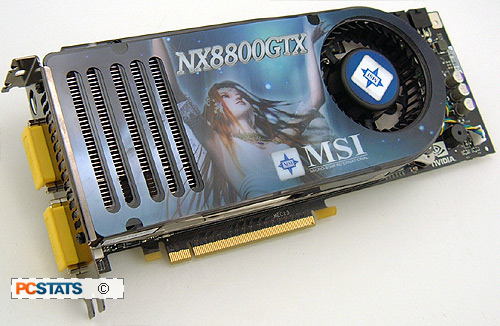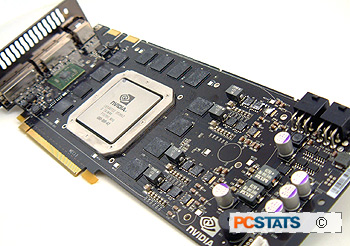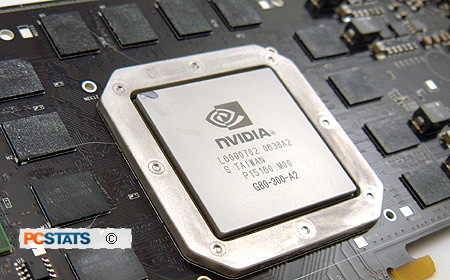 DirectX 10 requires a
pretty major system overhaul. From processor to memory, videocard and even
operating system, you'll need a new computer to run the next generation games
which are coming out soon.
DirectX 10 requires a
pretty major system overhaul. From processor to memory, videocard and even
operating system, you'll need a new computer to run the next generation games
which are coming out soon.
nVIDIA has beaten ATi to the punch and has released its
long awaited G80 core in two variants, the high end mainstream GeForce 8800GTS
and bleeding edge GeForce 8800GTX. Both bring new technologies to the table and
promise a lot of performance and an equally hefty price tag.
The MSI NX8800GTX-T2D768E-HD is MSI's flagship
videocard, and with a price of $693 CDN ($613 US, £314 GBP), it's certainly hard
on the wallet.
The NX8800GTX-T2D768E-HD has 768MB of GDDR3 backing up
the GeForce 8800GTX core. The memory runs at 1.8GHz, and the GPU at 575MHz. The
videocard supports dual DVI outputs at up to 2048x1536 resolution, TV and High
Definition Component output, and HDMI through DVI-to-HDMI cables. With HDCP
compatibility, the NX8800GTX-T2D768E-HD can play those copyright protected
HD-DVD/Blu-Ray movies that are now starting to come out in WindowsXP and Windows
Vista.
Despite the high price tag of the MSI
NX8800GTX-T2D768E-HD, the videocard doesn't come with many frills aside from the
necessary connectors (DVI to analog converters, molex to six pin power
converter, video output cable) and a copy of Serious Sam II. MSI usually
includes more goodies with its videocards, and to us it doesn't make much sense
to include a bunch of old titles.
At the time of this review Microsoft Windows Vista was
not available for testing, but it has become evident that nVidia is a little
behind on its Vista drivers now that the operating system is out. PCSTATS
advises you to check up on that situation before plunking your cash down on any
DX10 videocard for use with Vista.
 The NX8800GTX-T2D768E-HD videocard itself is
based entirely on the reference design. Manufacturers have long stuck with
nVIDIA reference designs since it is the most reliable. The stock dual slot
cooler does a decent job at keeping the GeForce 8800GTX core and memory cool,
although that's a pretty difficult task. If you're considering running one, two
or four of these videocards, you'd better have very good
system airflow! Simply saying GeForce 8800GTX based videocards get hot is an
understatement!
The NX8800GTX-T2D768E-HD videocard itself is
based entirely on the reference design. Manufacturers have long stuck with
nVIDIA reference designs since it is the most reliable. The stock dual slot
cooler does a decent job at keeping the GeForce 8800GTX core and memory cool,
although that's a pretty difficult task. If you're considering running one, two
or four of these videocards, you'd better have very good
system airflow! Simply saying GeForce 8800GTX based videocards get hot is an
understatement!
You'll be glad to know though that during testing the
MSI NX8800GTX-T2D768E-HD only generated a moderate amount of noise when gaming
even with AA/AF enabled. It's a good idea to clean the exhaust vent and
heatsinks on the videocard of dust on a regular basis. Dust will impact the
heatsink's cooling ability.
For those of you with a lot of money, the right
components, you can run four GeForce 8800GTS/GTX videocards together for Quad
SLI. Whether one needs that much rendering power is debatable however you'd
definitely make all the computer geeks you know jealous. ;-) If you're going to
be running SLI with only two videocards, you only have to connect one set of the
SLI bridge connectors on the videocard.
While the MSI NX8800GTX-T2D768E-HD is powerful 3D
rendering videocard, it also uses up a lot of energy. In fact of all videocards
tested at PCSTATS, the NX8800GTX-T2D768E-HD-based system consumed the most power
(345W - total system power draw), 12W more than ATi's Radeon X1900 XTX, and 30W
more than the dual GPU GeForce 7950GX2 when running at full load! At idle, a top
of the line computer system with the GeForce 8800GTX pushes almost 200W (total
system power draw).
 It's pretty obvious
that these power consumption trends cannot continue unabated. Rumors have been
suggesting that the G80 will be the last of the power sucking GPUs, and that the
future is moving towards parallelism, like processors. With multi-videocard
rendering (SLI/CrossFire) gaining popularity and support, it wouldn't surprise
us if multi-core GPU platforms are the way of the future.
It's pretty obvious
that these power consumption trends cannot continue unabated. Rumors have been
suggesting that the G80 will be the last of the power sucking GPUs, and that the
future is moving towards parallelism, like processors. With multi-videocard
rendering (SLI/CrossFire) gaining popularity and support, it wouldn't surprise
us if multi-core GPU platforms are the way of the future.
The MSI NX8800GTX-T2D768E-HD was an absolute monster when
it came to the benchmarks. It not only beats out the previous nVidia GPU
generation, it does so by a large margin. This baby can easily run full AF and AA
modes with plenty of power to spare.
In our overclocking tests the MSI NX8800GTX-T2D768E-HD
videocard reached a very respectable core frequency of 665 MHz, and memory
frequency of 2132MHz. That gave us a nice boost above stock speeds in most
benchmarks. Please keep in mind that overclocking did not affect overall
performance by significant degrees, as the MSI NX8800GTX-T2D768E-HD was pretty
much system limited. If you plan on overclocking a GeForce 8800GTX videocard,
you'll need to overclock the rest of your PC to see a real benefit.
That last bit pretty much sums up this videocard, the
MSI NX8800GTX-T2D768E-HD is fast but you absolutely need a strong supporting
cast of computer components to get the most out of the massive Geforce 8800GTX
768MB PCI Express x16 videocard. With Microsoft Windows Vista, perhaps it's time
for a total computer system overhaul anyway?! If you can afford it, and you have
an equally cutting edge system to match, the MSI NX8800GTX-T2D768E-HD will be
the foundation of one truly killer WindowsXP based gaming rig. And for Vista..?
Well, we'll just have to wait and see on that front.

Find out about this and many other reviews by joining
the Weekly PCstats.com Newsletter today! Catch all of PCSTATS
latest reviews right here.
Related Articles
Here are a few other articles that you might enjoy as
well...
- Biostar Sigma-Gate GeForce 7600GS V7603GS-21 Videocard
Review
- Asus EAX1950Pro HTDP/256M/A Radeon X1950Pro Videocard
Review
- Gigabyte GV-NX76T256D-RH Silent Geforce 7600GT Videocard
Review
- nVidia's Geforce 7950GX2 and the MSI NX7950GX2-T2D1GE
Videocard Review
- MSI NX7900GT-VT256E-HD HDCP-enabled Geforce 7900GT
Videocard Review
